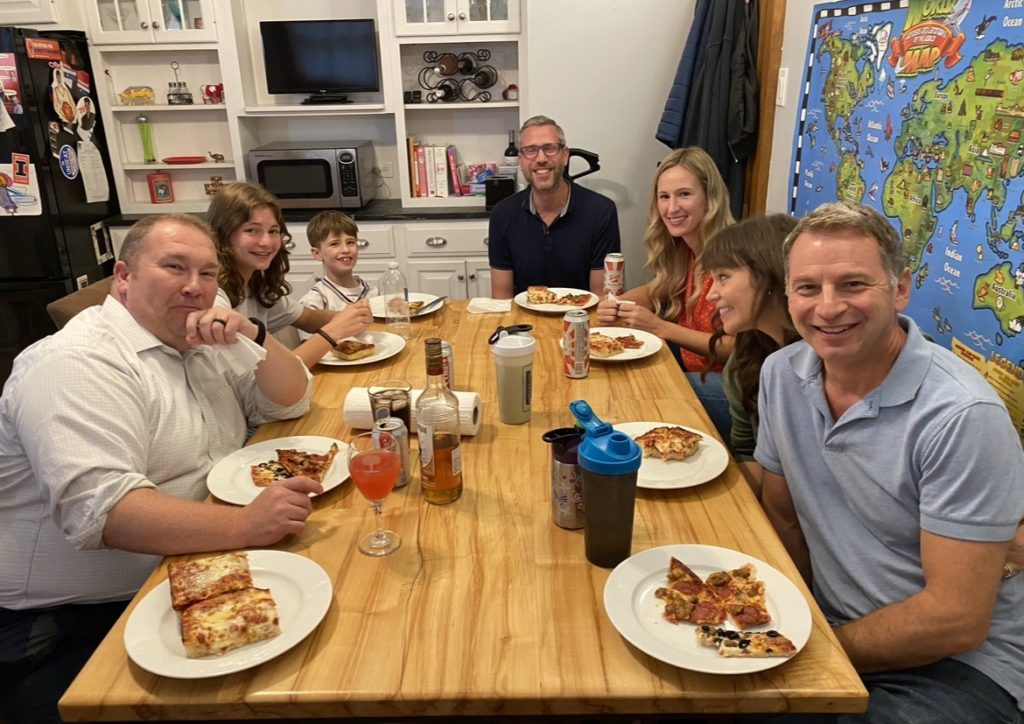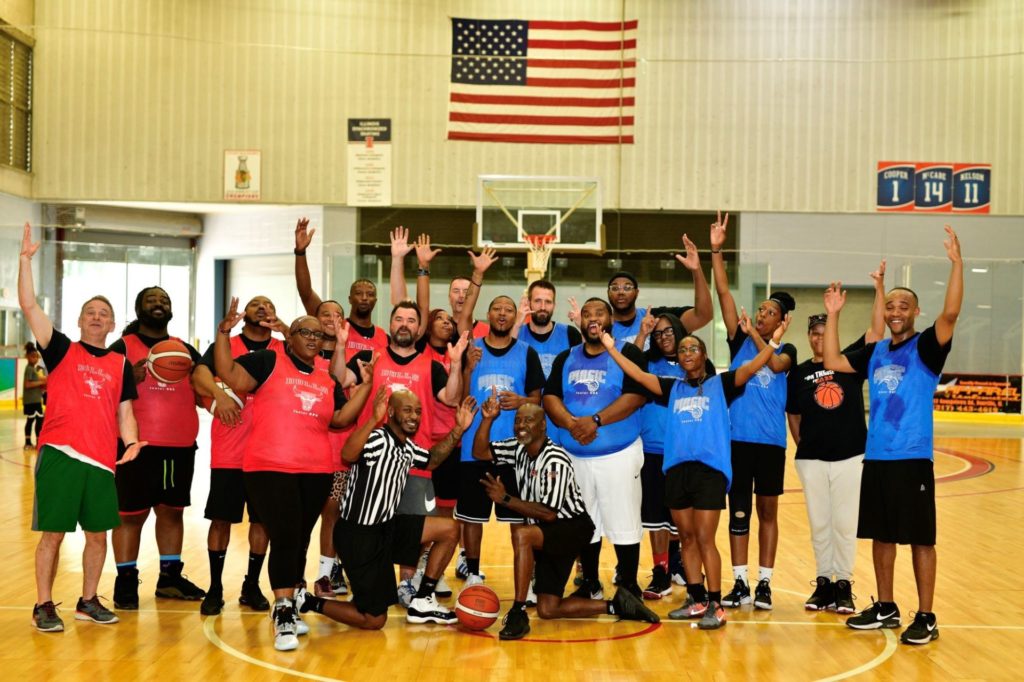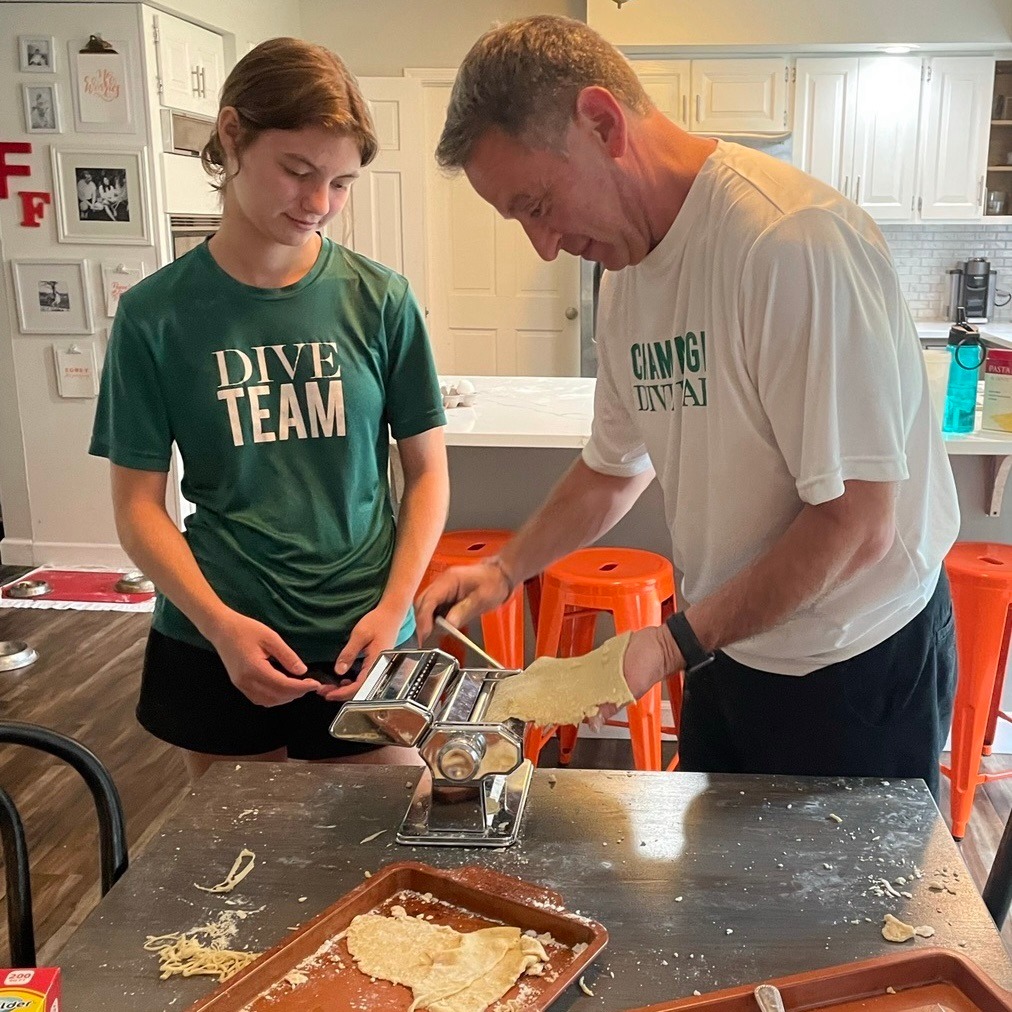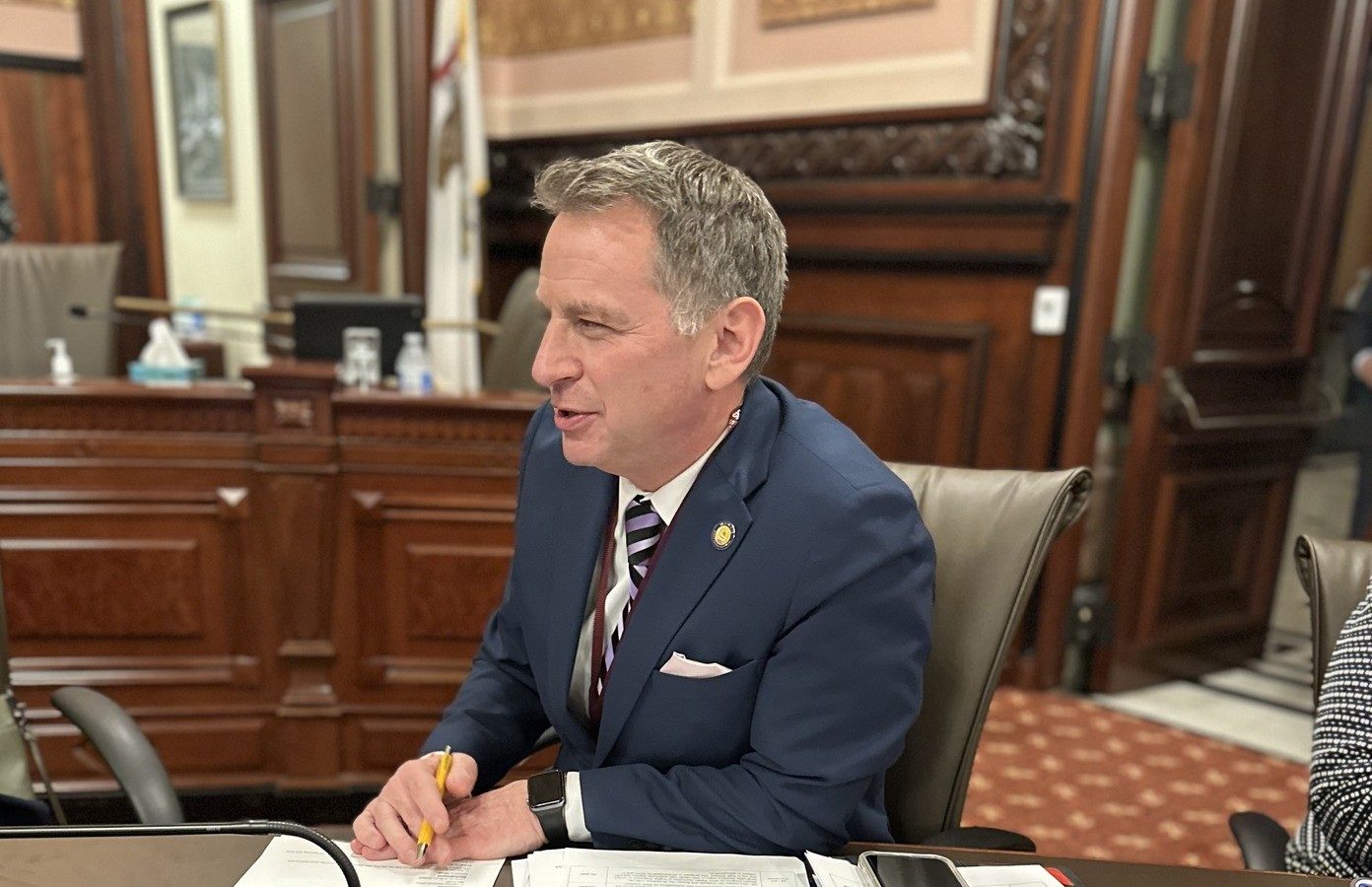Illinois State Senator Paul Faraci is about as townie as they get for someone who wasn’t born here. After moving with his family from the south side of Chicago, he graduated from Edison Middle School, Champaign Central, Parkland, and then University of Illinois. His parents owned The Great Impasta and Jane Addams Bookstore, and he’s been the owner of a sandwich shop as well as City of New Orleans, a restaurant that formerly occupied the space that is now Maize at the Station. As Faraci says, “I feel like if you own a business in a community, you can be considered a townie.”
He began serving on Champaign County Board and realized he wanted to move in a different sort of direction, making a community impact through government rather than private business. As he would later share, he never envisioned himself in the role he’s in now, one that came about due to the tragic loss of his friend and predecessor Scott Bennett.
A few weeks ago, I met Faraci in his Champaign office to talk about his journey to being an Illinois State Senator, how he’s carrying on Scott Bennett’s work, and what he’s looking to accomplish in the future.
This interview has been edited for length and clarity.
Smile Politely: What drew you in the direction of public service?
Senator Paul Faraci: I think the fact that mom and dad started businesses in Downtown Champaign. Although they weren’t running for office, they were very service-oriented, very community-oriented, and took huge gambles. They put their heart and soul into their businesses to serve their community. That was sort of the beginning of my interest. Dad served on the regional planning board for the city, and when I ran for County Board I could tell he was really excited. County Board took me from restaurants into a different angle of public service. I did that for two years, ran for County Clerk and got beat. Ultimately I went to work for the Illinois Department of Commerce. I really enjoyed helping people, and got excited about trying to find resources and solutions to people’s problems. Gordy Hulten was my City Council person in District 5, and he went on to become County Clerk, so that seat became open. It was very last minute, so it had to be a write-in campaign. [My wife] encouraged me to run for that seat. There were three of us who ran, so it was an extensive effort on my wife’s part [to run a campaign]. We did really well; I think we got like 55 percent of the vote. I absolutely loved being on City Council. Then Brian Christie, who was the township assessor, resigned, and that seat opened up. I spent a year and a half getting certified to run, and then became the assessor.

SP: I know that you and Senator Bennett were friends. I’m so sorry for your loss.
Faraci: What I didn’t realize is a lot of people considered Scott Bennett one of their best friends. I didn’t realize the impact [he had] until taking this job, until losing Scott. A profound impact. And such a positive impact. The senator and I, and his wife and my wife, became friends. The Bennetts actually lived with us during a transition period of moving from Urbana to Champaign, and we really became close at that point. My daughter helps take care of his kids when Stacy [Scott’s widow] needs help.
SP: I imagine it was sort of a whirlwind of a time after his death. Can you speak to your decision to put your hat in the ring to fulfill his role, and what that was like? Going through that process while also grieving your good friend?
Faraci: It was a challenge. In fact when it first came up, I said absolutely not. This is way too soon to be having these conversations about replacing someone who is irreplaceable, and someone who had such a huge positive impact on my life. A few days went by, and I was re-approached and asked to consider it. I looked at my wife and said, “We’re not going to be a part of this.” My wife said “Hang on a second. Someone’s going to need to do this.” [She] felt like the timing was right. [We thought], “Would Scott Bennett want me to run?” That was a question I hadn’t really asked myself. So we gave it our best shot. If the committee likes us, great. If they don’t, then there’s no regrets, no looking back at “what if.”
I feel like we did a good job making our case, as did eight other very qualified candidates. To say this is an honor, and very humbling, is an understatement. Bennett left big shoes to fill. He did it with such style, and grace, and humility. It’s really hard to match that, but my hope is with him looking down that he’d be proud of the work that we’re doing. We have miles to go before we sleep, and miles to go before we’re close to accomplishing the kinds of things that Scott Bennett accomplished.
SP: What sort of works in progress have you been able to take on and continue in this past session?
Faraci: A lot of his passions, he had put a final point to before he passed, which is kind of amazing in itself. The things that he was very good at — these are the committees that I’m on — were ag, higher education, labor, and health and human services. I sub in sometimes on local government, which I really like.
The thing that Bennett really had a knowledge of, that I’m getting brought up to speed on, were people who live in the margins, people who are underrepresented, people with developmental disabilities. That’s been a real focus — making sure I’m the best I can be, utilizing the resources around me to become better at understanding those issues. I hired a part-time person who focuses primarily on internships and internal relations, and we have a fellow from the University of Illinois who has a special education background. The three of us — really the two of them — they’re digging into what those issues are and how we can better help people who are developmentally disabled. We said, “Let’s prioritize the issues that we can correct without legislation, then those that may need legislation.” So we’re doing yeoman’s work on how we become more like the top ten states that help people with disabilities, as opposed to the bottom ten. Bennett was a champion there, and when we lost him I feel like the community was terrified, rightfully so. I’m doing everything I can to be that champion, to fill in those gaps the best we can.
SP: It’s a unique situation, where you’re coming in for someone who didn’t intentionally step out of a role, and trying to continue the work that he began. I’m sure you have issues you’re passionate about as well, and I saw that you’ve begun an election campaign?
Faraci: I’m absolutely running for the seat again. If I have a primary opponent that will be in March. In fact, the committee to appoint a person to this office asked if I’d be willing to run. It’s something they felt was important. I committed to that at the beginning, and I’m even more committed to that today.
SP: Are there issues that you really want to focus on going forward?
Faraci: With the background I have in owning my own business, and working for the Illinois Department of Commerce, workforce and economic development is one of my biggest passions; making sure we’re doing things strategically to improve quality of life for the middle class in the district and in the state. You do that through continued education, making sure people are getting the workforce training they need. We have all of these opportunities for economic development, but if we don’t have the workforce trained and ready to go, those investments will fall flat. I’d love to see an increased improvement on how we move people. One of those things I’m having conversations about, though some may think it’s pie in the sky, is an improved rail, including high speed rail. Improving even the 70-mile-an-hour rail is an advantage to our workforce.
SP: What does summer look like in this role? What sort of work is happening between sessions in Springfield?
Faraci: There’s a lot happening. As a new legislator I have an obligation to try to meet all the people that Senator Bennett knew and worked with. I wouldn’t say it’s slowed down by any stretch.
SP: It’s just different work.
Faraci: Yeah, and it’s making sure I meet people that have an interest in the communities, listening to them and learning from them. So speaking at events, going to meetings, and meeting elected officials has been a priority. A friend of mine who’s a pastor in Danville had an event, On the Court for a Cause. I thought I’d help set up chairs and tables and serve popcorn. No, he wanted me on a team.

SP: How confident did you feel about that?
Faraci: I’m by far probably one of the worst basketball players he’s ever seen. I led the team in turnovers and fouls. But those are the kinds of things [I’m doing]. They potentially have a lot of impact on the community. Anywhere I can learn more about the community and help them has really made it very satisfying and enjoyable.
SP: What’s been the most challenging part about taking on this role?
Faraci: The realization of how much work there really is. People just need help. They need a resource. Sometimes we’re fortunate to be able to help people, and sometimes we just don’t have the resources. I’d say that’s the most challenging thing, to see people suffering and not be able to help.
SP: What’s the most rewarding?
Faraci: When we are able to help. They talk about the “power of this office” and I guess that’s what that means. This office isn’t about me or the staff, it’s about making sure we do all the right things for the right reasons, and leave it in better shape than we found it. Someday someone else is going to sit here and have this role. This is about the people we can have a positive impact on, today or in the future.
SP: Okay, onto some lighter content. What was your first job?
Faraci: I tell people that at heart I’m a busboy and dishwasher. I worked at the Red Wheel at Springfield and Prospect. My sister, three years older than me, got me the job. She was a waitress. I absolutely loved it. I only did it for probably six months, but it had such an impact. Then I ended up getting a job at the Fitness Center. I just loved working behind the front desk. The president of a local bank would come up, give me his card, and always ask for grape juice with ice. Then I got to know his brother and what his brother drank. I enjoyed making people feel comfortable. After working there for seven years, when I called that bank and asked for a loan to open my restaurant, and they said “Sure, Paul.” They knew me. It was maybe the only way I was going to get a loan. I’ll never forget them for that.
SP: Our readers love C-U nostalgia. Beyond those places you’ve been involved with, Is there a place — restaurant or otherwise — that is gone from this area that you wish was still here?
Faraci: I’m going to struggle to remember the name of it. There was a place my dad and I used to go to. It was very dark, and I believe they used to serve peanuts. Ultimately Pickles took their spot.
SP: Ground Round?
Faraci: Yes, that’s it. My dad and I would go, and I have very fond memories of time spent there. Later on we’d go to Pickles together, and solve the world’s problems. But truthfully, The Great Impasta. I wish it was still here, and I wish my dad was still here.
SP: What’s your favorite restaurant now?
Faraci: I’m going to have to say all of them. But the truth is, local places. People who have the lived experience of being business owners. We want to support them as much as I can. But I like to cook so much. Really one of the things I miss now that I have this job is cooking for my wife and daughter.

SP: What do you most like to cook?
Faraci: I showed my daughter how to make homemade pasta and pesto, because my dad showed me. Almost any recipe from my mom and dad, that’s what I most enjoy cooking.
SP: To wrap it all up, what do you most want people to know about working in public service, or as an elected official?
Faraci: I would really encourage people to get involved. If you’re not registered to vote, get registered to vote. Learn about the issues. Run for school board. Run for city council. We need good people who care about what happens to us involved in local politics. It’s critically important. Never did I dream I’d be doing this, when I ran for county board or city council.
SP: Really? You didn’t think about going to the next level?
Faraci: It was never on my radar. I had no interest in doing that. But I believe [my involvement in local politics] prepared me for this role. So I just encourage people to get involved, and get active. Get involved in things that are happening in the community.








